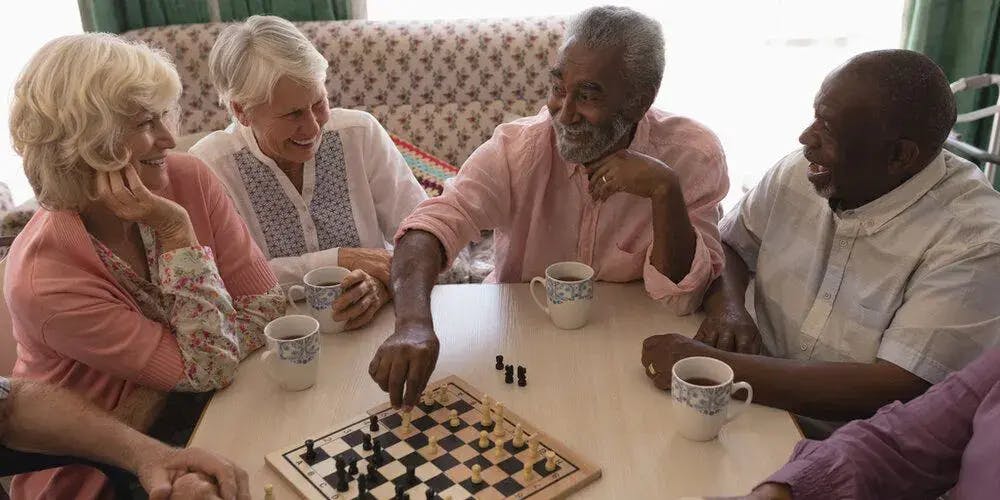How to Promote Equality & Diversity in Care Homes

Estimated Reading Time: 7 minutes
All people have the right to access health and social care that treats them with dignity and respect. This means it is essential for all providers to consider how to promote equality and diversity in a care home.
Whether it be race, religion or beliefs, or sexual orientation, each person deserves to have their identity and individual needs recognised. Without this, quality healthcare cannot be provided.
In this article, Lottie delves into equality and diversity within care services, examining what must be done to meet legislation and how homes can go beyond this to help their residents thrive.
Kickstart your care search
Find the best care homes in your area through Lottie.
What Does Equality & Diversity Mean?
Although they are often grouped as a single concept, equality and diversity are distinct terms and it is important to consider them separately.
What is Equality?
Equality means ensuring that the opportunities and rights afforded to individuals are the same, regardless of their background and identity. It also means that everyone is treated equally. As a care provider, you must pursue equality in terms of both staff and residents in the home.
Viewing each person as deserving of the same chances is vital for giving quality care to those you are responsible for. Without this, you may negatively impact their happiness and risk failing to meet the standards set out by law.
What is Diversity?
Diversity in health and social care refers to the need to recognise the unique experiences of individuals, showing appreciation for each person’s culture, lifestyle and values. You must display respect for these differences in the care that you offer.
Diversity and equality work hand-in-hand to guarantee that a service user’s identity is seen, without it causing them to feel alienated.
Why It’s Important in a Care Home
Promoting equality and diversity must be central to the management of any social care company. This is necessary to comply with the requirements set out for you by law, but also to meet the needs of those who’s care has been entrusted to you.
Laws & Regulations
To ensure fair treatment and equal opportunities for people in care, successive governments have created legislation protecting their rights.
The Equality Act 2010
The Equality Act was signed into law in 2010, with the aim of unifying anti-discrimination legislation under one banner. It outlaws unfair treatment for any of the following reasons:
- Sex
- Age
- Disability
- Race
- Religion or belief
- Sexual orientation
- Marriage or civil partnership
- Pregnancy or maternity
- Gender assignment
Under the Equality Act 2010, these are all considered protected characteristics. Should someone feel they have not been treated fairly because they belong to one of these groups, they can take action through civil courts.
As a care provider, you are legally obliged to protect residents from this unfair treatment. Issues you must be particularly aware of include:
- Denying an applicant a space in a home due to one of these characteristics
- Neglect or abuse of a resident due to one of these characteristics
Freedom from abuse and neglect are the minimum a person in your care should expect. You should be taking further action to promote equality and aid each to live happily.
The Human Rights Act 1998
The Human Rights Act 1998 (HRA) outlines the basic rights and protections each person in the UK is entitled to. Although the legislation was not originally applied in care homes, it’s scope was extended to include them in 2008.
The act covers a wide range of possible injustices, with the rights it covers best summarised as the following:
- Fairness
- Respect
- Equality
- Dignity
- Autonomy
We’re here to help you find the right care home for you or your loved one. You can request a free list of care homes from our care experts, who will then share homes matching your budget, location and type of care needed. You can also search for a care home through our easy-to-use directory.
The Care Act 2014
The Care Act 2014 was created to specifically protect the rights of those in need of support, so they can live a free and fulfilling life.
The act aims to personalise services and guarantee that support is individualised, to meet each person’s needs. Additionally, it enshrines prevention at the heart of care, emphasising the need to lead healthy lifestyles and to protect older people from neglect or abuse.
Centralising assessment and care regulation under a single legal framework, the act makes care easier to understand. All care providers should familiarise themselves with the protections and processes set out by this law.
Additionally, care homes must consider how prevention can be incorporated throughout their operations. Vigilance to avoid infringements of people’s rights and dignity in care is therefore paramount.
The Mental Capacity Act 2014
The Mental Capacity Act (MCA) was passed in 2014, to protect those with impaired mental capacity. It aims to empower these people, by setting out a framework for assessing their ability to make decisions and advising on how best to assist them.
Elderly people are more likely to be covered by the act, due to their increased risk of experiencing health difficulties. Medical conditions, such as dementia or strokes, can impair cognitive function and mean help is required to make decisions.
Guidance on which service users may be in need of support through the MCA, as well as the process for evaluating their requirements, can be found through the NHS.

Promoting Equality & Diversity
To meet legal requirements, as well as their social responsibility, all care home providers must promote diversity and equality. Proactivity is key here, with action to protect and uplift the most vulnerable considered in every decision.
Code of Conduct
The first step any care home wanting to improve diversity and inclusion should take is to implement a code of conduct. This will set out minimum expectations for all staff, providing a structure to deliver equal opportunities and care for all.
As a basis, the Skills for Care ‘Common Core Strategic Equality and Diversity Principles’ can be used.
These are:
Commitment to Equality, Diversity and Human Rights Values
Definitively committing to these principles sets the tone and direction for the service that your care home offers. A clear declaration of this must therefore be made within your policy.
Promoting Equality, Diversity and Human Rights in Decision-Making
Diversity and inclusion should be considered at all levels of your business. Representation at the most senior levels of your company is vital to ensuring this in high level decision-making, whilst training for more junior employees will encourage it in everyday operations.
Advancement of Equality, Diversity and Human Rights
Your code must incorporate the need for work to improve equality and diversity. Any new business developments would thus be planned with these ideas considered.
Monitoring Equality, Diversity and Human Rights
Monitoring the progress of diversity and equality is important so that your business can learn what’s effective and implement changes. Your code should therefore set out a system for measurement and review of all efforts.
Commitment to Equal Access and Open Standards
Finally, you must ensure that your service is open to all, regardless of background or identity. To do so, you must identify barriers that individuals may face and provide assistance to help overcome them.
Diversity in the Workplace
You cannot promote equality and diversity without listening to the voices of people who are different from you. This means it’s vital to hire staff from varied backgrounds, so that different perspectives can be heard in the management of the facility.
Initiatives to guarantee equal access to employment at all levels of your business will help to diversify both the decision-makers and employees responsible for daily caregiving. This will increase awareness of challenges people may experience and encourage vigilance against them.
Further Reading & Resources
For care providers wanting to learn more about equality and diversity, the below resources can provide further information.
Common Core Strategic Equality and Diversity Principles
Lottie matches care seekers with the best care homes for their needs. You can request a free care home shortlist from our care experts, who will share homes matching your budget, location and type of care needed. You can also search for a care home through our easy-to-use directory.



